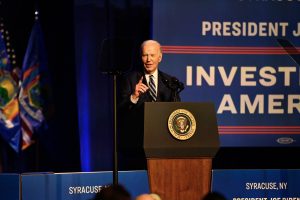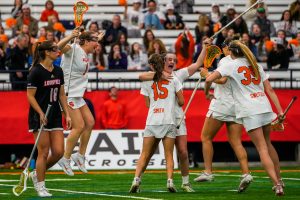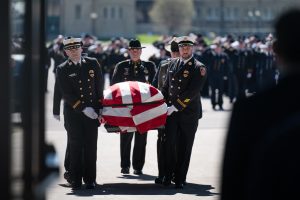Negative tests, positive outlook
Negative tests, positive outlook
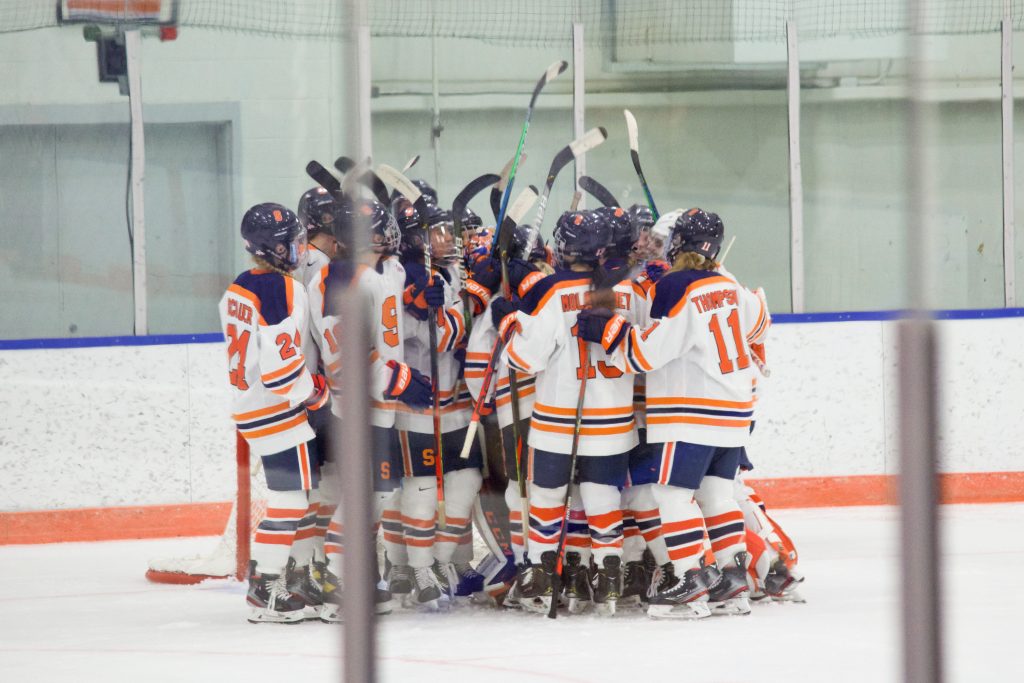
In COVID times, how a team measures “success” has changed. The Syracuse women’s ice hockey program is a clear example of that. They may be a few games shy of a winning record, but, this season, having no positive COVID-19 tests and earning the highest team GPA in the fall semester are accomplishments in and of themselves.
Despite return-to-play initiatives allowing for sports to return to a semi-normal state of being, few, if any, teams have been immune from the effects of COVID-19. From increased testing and restrictive bubbles to schedules riddled with ‘postponed’ and ‘canceled’ labels, it has become increasingly difficult for athletics to keep up with changes on a, sometimes, daily basis.
Syracuse’s winter sports – men’s and women’s basketball and women’s hockey – have dealt with numerous issues in the already shortened season. Women’s basketball postponed their game against UNC scheduled for Dec. 31 due to a positive COVID-19 test within the program and have not played a game in the weeks since. Men’s basketball faced multiple setbacks as head coach Jim Boeheim tested positive in mid-November, and in early December, the team was without Buddy Boeheim and a cluster of other players after they were in contact with someone who tested positive. Later in the season, several men’s basketball games were postponed after players on opposing teams tested positive.
The women’s hockey team found themselves in similar situations, but with far fewer blows to their schedule.
“I know that everybody’s effected and [it’s] not just us, so it’s not really that hard to stay motivated,” said freshman standout Rayla Clemons. “Everybody’s going through the same thing right now. Just working hard and playing when we can and using the opportunities that we have helps us stay motivated.”
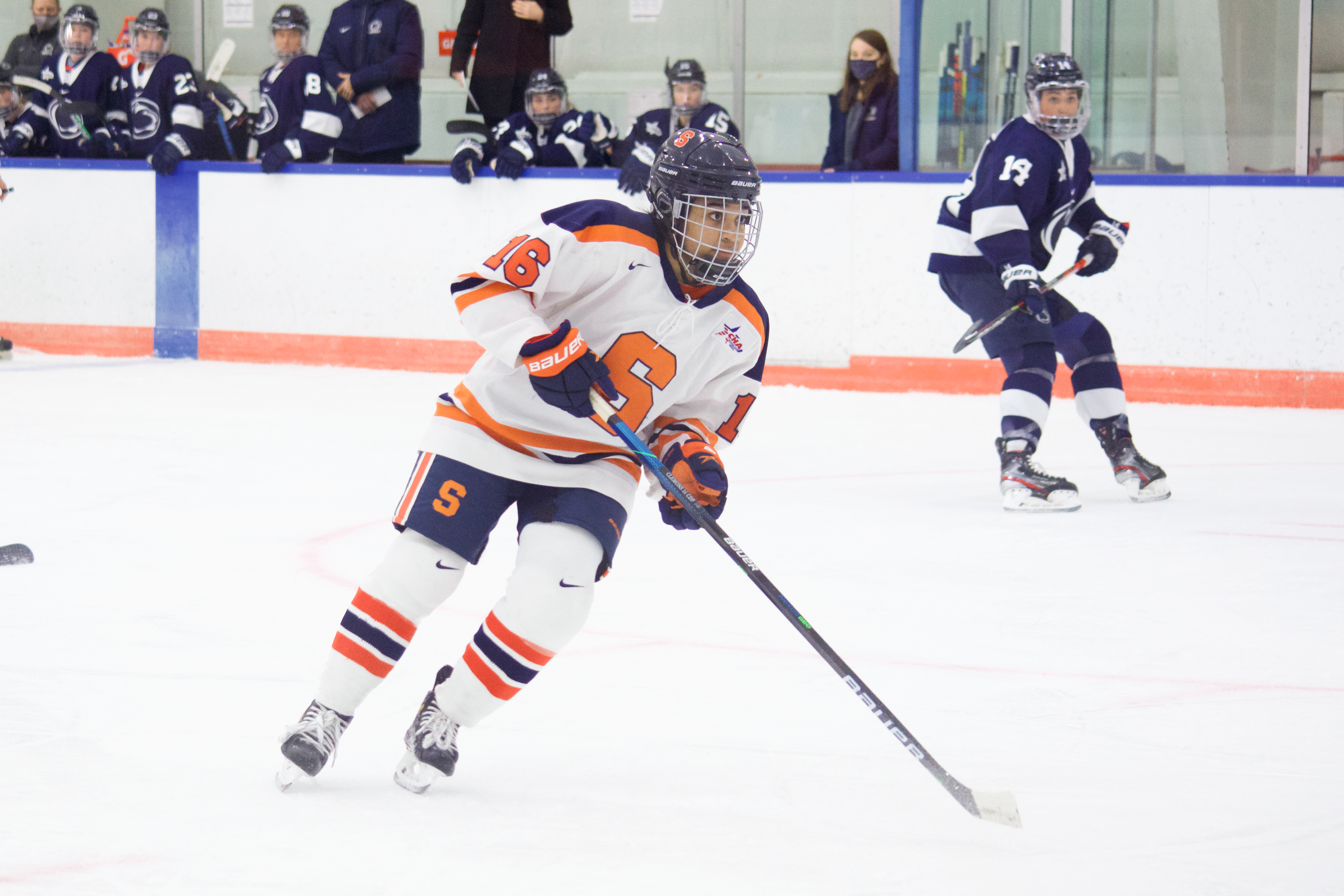
In a season that typically begins in September, only three games thus far have been postponed since their start in November, and all of them are due to COVID protocols within their opponents’ programs. In these times, it’s something to be applauded that the 20 person roster – which boasts 15 international players from across Canada – has avoided any COVID-related issues within the program.
That is not by accident.
“Going into the season with the delay and the unknown, this season is all about mental toughness,” said senior alternate captain Emma Polaski. “We have no idea what’s going to happen next, and of course it’s hard to stay positive when our games get canceled. But I think we’ve decided as a team to look at it in a positive light. We’re really trying to stay strong and look at it that way.”
Head coach Paul Flanagan echoed Polaski’s comments, noting how well he thinks his team has handled the disappointments this season.
“The kids are taking it in stride, as well as the staff, and it’s been almost a year now,” said Flanagan. “I think you get sort of conditioned to these setbacks and can understand why, so just move on. We will continue to practice and train like we have been. That’s the nature of sport right now.”
Accepting the new normal in the sports world meant changing approaches to training, practices and games. Armed with the all-too-familiar guidelines of quarantining and staying safe, the skaters returned home to spend some well-deserved time with their families. However, staying in shape away from the rink was easier said than done.
“Our strength coach had all kinds of ideas for them, but some kids could get out and do things after quarantine and other kids couldn’t go anywhere,” remarked Flanagan. “Most of the kids in Ottawa, even though there’s outside rinks, the city wouldn’t let them on the rinks because of the lockdown.”
Although veteran Polaski did not feel much of a difference from years past, it wasn’t a surprise that most players needed a few extra rounds on the ice to get back into game-time shape before the start of the second half of their season.
“We just have to get the cobwebs out for the first few weeks, and honestly, these couple weeks are very important with focus,” said Polaski. “If we’re not focused, it kind of sets the tone for the rest of the season.”
Flanagan mirrored that, saying this year’s mindset has changed because of the pandemic, maybe even for the better.
“The glass is half full, everything that we say, everything that we’re trying to do, the glass is half full,” explained Flanagan. “So much of the game is just feeling good about yourself and flushing out the distractions. If we can do that, keep things very, very positive in all the things that we do, how we talk to the kids, how we’re doing everything, it’s probably a lesson for what we should do on a regular basis. I think we’re all learning a lot here.”
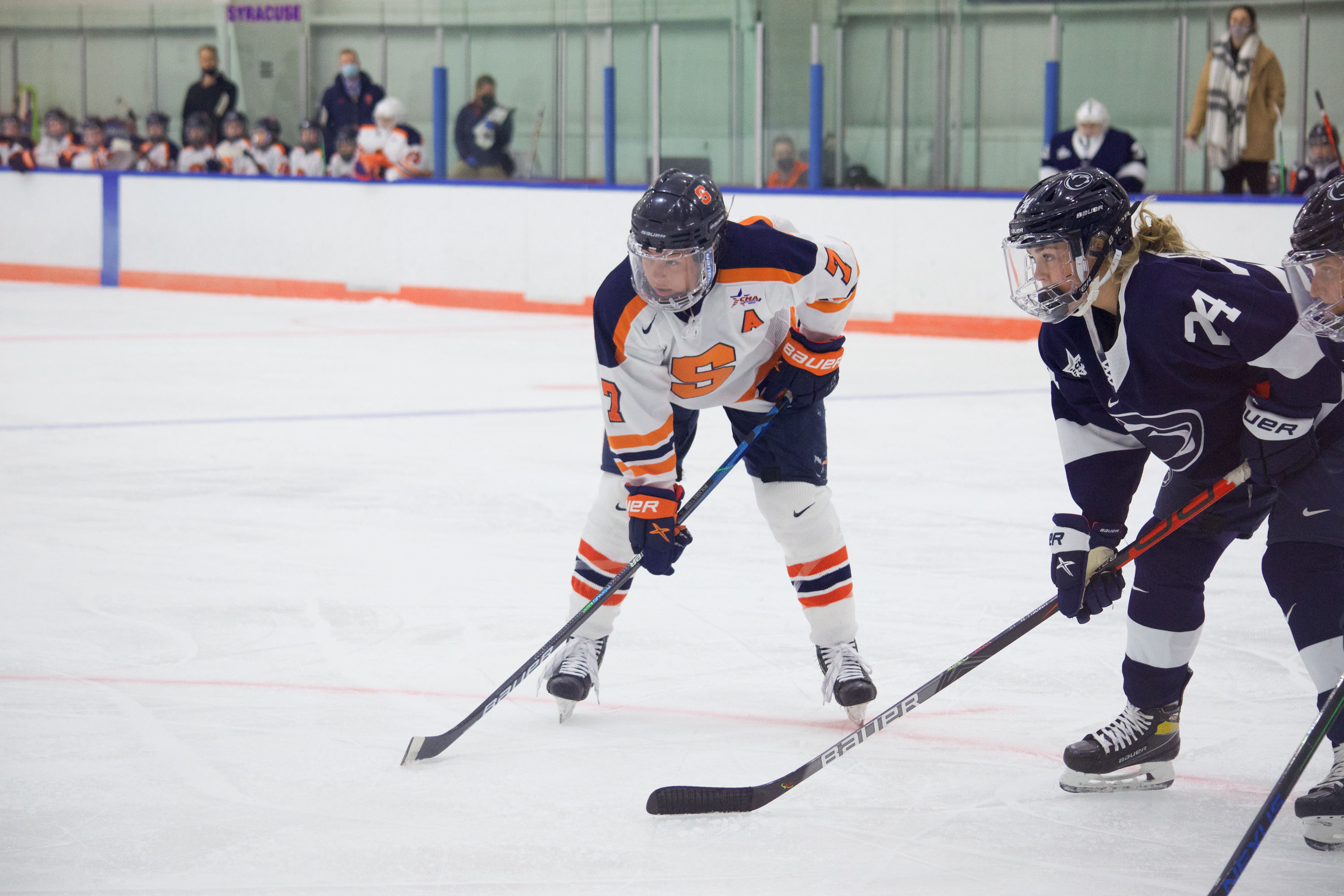
With everything dictated by new health protocols this season, ice time – especially game time – is more important than ever. Before going home for winter break, this year’s team was only able to play seven games. At the same time last season, they already had 19 games and six wins under their belt. More than ever, every game counts.
“Sometimes, you’re as good as your last game. We actually played pretty well when we played Penn State,” said Flanagan. “We really put it together, played a full sixty minutes and had some timely scoring, good goaltending and just a really good, solid effort.”
But as much as the team tries to make the most of every game, those aforementioned postponements can quickly disrupt any rhythm the team can create. Most recently, that came when their first opponent back from break, Lindenwood, cancelled the double header at Tennity Ice Pavilion.
“[It’s a] little bit of a different mood,” Flanagan continued. “Sometimes, it lends itself for kids losing focus a little bit. We were building from Sunday … with really good, productive practices because you have a focus; you’re going to play Friday.”
Despite disappointment over their first complete series being postponed, ‘look on the bright side’ continues to echo throughout the locker room. Polaski is grateful for the extra time on the ice, saying that it actually feels more like their schedule in years past.
At the end of the day, Flanagan knows that, even as head coach, there is a lot that is out of his control this year. One thing he can control is how his team approaches the game. Now more than ever, he’s focused on his players’ mental health and doing everything he can to make college hockey fun for his team.
“To be honest with you, for me, the biggest thing is your mental health,” said Flanagan. “If you just go home and worry about everything and you come up and have that all bottled up, you’re not going to be productive. I think our kids, as a group, have done a good job just processing things, what’s going on around them.
“There’s more than just the COVID, there’s a lot going on and to process that and come back and relish being with your teammates and being able to practice, we’re so grateful that the school is … allowing us to do what we’re able to do and don’t take anything for granted. In a normal year, you take everything for granted and then you even want more, so we’re just trying to be grateful for what we have and make the most of it.”

